Moment's Notice
Reviews of Recent Recordings
(continued)
Eric Revis Trio
Crowded Solitudes
Clean Feed CF363CD
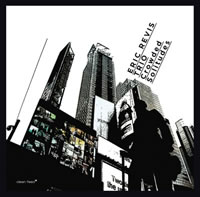 Although best known as the longstanding bassist for Branford Marsalis’ quartet, Eric Revis has made a viable career for almost two decades shuttling between both the mainstream and avant-garde jazz scenes. For his second trio date as a bandleader, Revis is once again joined by adventurous pianist Kris Davis – the group’s effective lead voice. Gerald Cleaver now fills the drum chair – a position once manned by Andrew Cyrille, who was prominently featured on City of Asylum (Clean Feed, 2013), Revis’ prior piano trio effort, and John Betsch, who served on the group’s last European tour.
Although best known as the longstanding bassist for Branford Marsalis’ quartet, Eric Revis has made a viable career for almost two decades shuttling between both the mainstream and avant-garde jazz scenes. For his second trio date as a bandleader, Revis is once again joined by adventurous pianist Kris Davis – the group’s effective lead voice. Gerald Cleaver now fills the drum chair – a position once manned by Andrew Cyrille, who was prominently featured on City of Asylum (Clean Feed, 2013), Revis’ prior piano trio effort, and John Betsch, who served on the group’s last European tour.
Revis’ back-to-the-future approach towards jazz composition recalls the halcyon early days of the AACM, evincing a heady amalgam of futuristic expressionism and neo-traditional impressionism, in a mixed program that brims with taut call-and-response interplay, modulating tempo shifts and sweeping dynamics. On kinetic numbers like “Arcane 17” and “Vertical Hold,” Davis’ flinty attack finds striking concordance with Cleaver’s slicing cymbal work and the leader’s brawny bass tone, emphasizing the percussive side of her technique. Cleaver’s ingenious textural asides materialize on “QB4R,” while “D.O.C.” demonstrates the threesome’s ability to swing it old school, in semi-conventional fashion.
There is a strong focus on Davis’ protean artistry across the album’s eight diverse pieces, although Revis’ pliant bass playing is especially notable during quieter moments, such as the mesmerizing title track and a hushed cover of Paul Motian’s lush ballad “Victoria.” On his own or with minimal accompaniment, Revis pushes the envelope of sound into venturesome territory, using an array of extended arco techniques to expand his palette with spectral harmonics and reverberating overtones.
The resurgence of the acoustic piano trio is ongoing; the artists advancing the form are increasingly manifold. Crowded Solitudes, a high water mark in this congested milieu, serves as a vibrant document of intrepid artists glancing backwards for inspiration as they simultaneously move ahead.
–Troy Collins
Roswell Rudd + Jamie Saft + Trevor Dunn + Balazs Pandi
Strength & Power
RareNoise Records RNR060
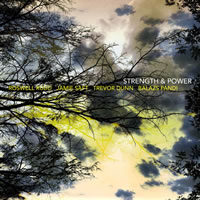 The recipe for Strength & Power is pretty straightforward: get avant-garde trombone legend Roswell Rudd into the studio with an envelope-pushing rhythm section, hit record, and see where they end up.The album’s key lies in Rudd’s encounter with three fabulous improvisers (all several decades his junior) whose experiences and influences run the stylistic gamut. Pianist and keyboardist Jamie Saft has a long history with John Zorn, as does bassist Trevor Dunn, who has also worked extensively with Erik Friedlander and the Melvins. Drummer Balazs Pandi’s credits range from noise and metal to free jazz sessions with Ivo Perelman, Wadada Leo Smith, and others. Saft, Dunn, and Pandi have appeared on numerous albums from RareNoise in the past several years, so many in fact that it seems as if a third of the label’s catalog features one, if not all three of them (for a small sample check out albums from Slobber Pup, Plymouth, Metallic Taste of Blood, and Spanish Donkey). Saft, Dunn, and Pandi are in many respects defining the label’s aesthetic. With the addition of Rudd, the listener has a dynamic set based serious listening chops and the juxtaposition of styles and approaches.
The recipe for Strength & Power is pretty straightforward: get avant-garde trombone legend Roswell Rudd into the studio with an envelope-pushing rhythm section, hit record, and see where they end up.The album’s key lies in Rudd’s encounter with three fabulous improvisers (all several decades his junior) whose experiences and influences run the stylistic gamut. Pianist and keyboardist Jamie Saft has a long history with John Zorn, as does bassist Trevor Dunn, who has also worked extensively with Erik Friedlander and the Melvins. Drummer Balazs Pandi’s credits range from noise and metal to free jazz sessions with Ivo Perelman, Wadada Leo Smith, and others. Saft, Dunn, and Pandi have appeared on numerous albums from RareNoise in the past several years, so many in fact that it seems as if a third of the label’s catalog features one, if not all three of them (for a small sample check out albums from Slobber Pup, Plymouth, Metallic Taste of Blood, and Spanish Donkey). Saft, Dunn, and Pandi are in many respects defining the label’s aesthetic. With the addition of Rudd, the listener has a dynamic set based serious listening chops and the juxtaposition of styles and approaches.
Rudd et al avoid the all-too-common free improv trap of sinking into a directionless and amorphous morass, devoid of time and purpose. The preponderance of this kind of playing in a free set is what makes the quartet’s embrace of meter so refreshing and somewhat surprising. Much of this comes from Pandi, as he is the groove’s primary architect. Some listeners may accuse Pandi of overplaying, as he is omnipresent and occasionally threatens to overwhelm the group. One’s ears are drawn to him even when he recedes to the background. It’s not that Pandi is louder or more active and aggressive than other free jazz drummers; it’s that he sounds like none of them, as his rock/noise approach – as demonstrated in part by plentiful toms fills – is rarely, if ever, heard in this context. The album opens with the lengthy title track, the first three minutes of which feature Saft’s somewhat spacey piano, Rudd’s understated plunger, and Pandi’s active, yet quiet drums. At the three minute mark Pandi introduces a medium tempo that the band settles into and rides. Saft and Dunn explore the ins and outs of Pandi’s groove while they counter and provide commentary on Rudd’s rips, snarls, and snorts. The five and a half minute throwdown “The Bedroom” grows from Pandi’s solo opening to a maelstrom of Rudd’s growling exhortations, Saft’s left hand bombs and plucked piano strings, and Pandi’s apparent efforts to puncture his drum heads, all while Dunn works to keep the wheels from coming off. The pseudo-ballad “Luminescent” is played over a weird 12/8 feel, while the group jettisons time altogether for the bulk of “Dunn’s Falls,” which not only provides a change of pace, but points to how effective varying approaches to time can be. Strength & Power closes with “Struttin’ for Jah Jah,” a raucous and boisterous cut with crooked nods to New Orleans and James P. Johnson. The tune’s surprises – such as the brief shuffle blues (not too many of those show up on free improv records) – and its confluence of disparate influences are the same qualities that make this dynamic, enjoyable, and inventive album worth numerous repeated listens.
–Chris Robinson
Henry Threadgill Ensemble Double Up
Old Locks and Irregular Verbs
Pi Records P164
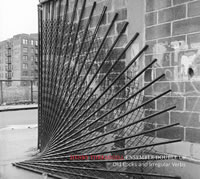 Make no mistake, this is a masterpiece. Threadgill debuts his first new ensemble in 15 years with a piece whose very multilayered complexity energizes and engages; one feels more and more uplifted as the piece progresses rather than worn down by its intricacies. Most of the ensemble parts are written using the intervallic approach he developed with Zooid and they interlock and overlap, generating an elusive push-pull of irregular rhythms that dance with the dignity and sensuality of a tango. Every minute of this piece feels fresh and alive and it consistently surprises as it journeys to an overwhelmingly emotional climax.
Make no mistake, this is a masterpiece. Threadgill debuts his first new ensemble in 15 years with a piece whose very multilayered complexity energizes and engages; one feels more and more uplifted as the piece progresses rather than worn down by its intricacies. Most of the ensemble parts are written using the intervallic approach he developed with Zooid and they interlock and overlap, generating an elusive push-pull of irregular rhythms that dance with the dignity and sensuality of a tango. Every minute of this piece feels fresh and alive and it consistently surprises as it journeys to an overwhelmingly emotional climax.
Threadgill doesn’t improvise on the album, and it doesn’t matter. His musical vision is realized with such thorough understanding, clarity, and empathy by Ensemble Double Up and each member possesses such a strong, personal voice as an improviser that the 47-minute continuous piece feels complete.
Like all of Threadgill’s bands since Air, the instrumentation of Double Up is unconventional. Jose Davilla on tuba and Christopher Hoffman on cello, holdovers from Threadgill’s Zooid, provide sonic and rhythmic continuity with the past. Pianists Jason Moran and David Virelles center the ensemble, giving it a certain extra weight and colors new to Threadgill’s music. Alto saxophonists Roman Filiu and Curtis MacDonald have internalized Threadgill’s vocabulary and make something personal of it. Drummer Craig Weinrib navigates the work’s modulating rhythms, but also functions as a melodic ensemble voice as well.
From its expectant opening, with the pianists’ notes wrapped in charged silence to its heart-wrenching conclusion, Old Locks and Irregular Verbs flows with a logic all its own. The music is full of bizarre plot twists – a drum solo where you don’t expect it; sudden bursts of sonic color, dense as a leafed out forest; unaccompanied solos that let the music breathe; pairings of instruments that vary the textures; climaxes in unlikely places. You sense the composer exploring the band, learning its possibilities, and reveling in his discoveries. It is composition instilled with the improviser’s aesthetic – fearless, spontaneous, and joyful. In its restless surge and retreat, its periods of clashing contrapuntal lines and episodes of harmonious peace, in its unresolving rhythmic tensions, and in the dialog between soloist and ensemble, Old Locks and Irregular Verbs is a both an unflaggingly inventive composition and a mirror held up to the way we live now.
The composition is dedicated to composer-conductionist Lawrence “Butch” Morris, and its final seven minutes moves away from the intervallic vocabulary into a mournful homage to Threadgill’s late friend. The pianos introduce the section with a hushed, almost gospel feeling and the rest of the band enter a few at a time, like dawn suffusing the world with warm, glowing colors. The ensemble passages sound almost choral in their transparency and timbre and everything builds to a great, rumbling, beseeching incantation of love and grief that is among the most beautiful passages Threadgill has ever written.
Threadgill has been showered with awards and honors this year and they are all richly deserved. In his music, perhaps more than in any other living composer’s, we hear America singing.
–Ed Hazell
Tournesol
Tournesol
Dark Tree 06
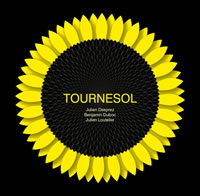 “Tournesol” is French for “sunflower,” a potent symbol of light, not something you might immediately associate with the music produced by the band it names, the trio of electric guitarist Julien Desprez, bassist Benjamin Duboc and percussionist Julien Loutelier. It’s dense, darkly resonant work in which the sounds usually associated with the instrumentation rarely occur. That deep resonance is the core, as if the group’s essential instruments were enormous metal bowls and stone cylinders and their inner surfaces were being rubbed to create ringing tones in the lowest register. Circularity, scale and subterranean energy may be the strongest associations with the name, suggestive of a vast underground factory whose purpose seems benign, like the perpetual grinding of a great stone prayer wheel somewhere within the Himalayas.
“Tournesol” is French for “sunflower,” a potent symbol of light, not something you might immediately associate with the music produced by the band it names, the trio of electric guitarist Julien Desprez, bassist Benjamin Duboc and percussionist Julien Loutelier. It’s dense, darkly resonant work in which the sounds usually associated with the instrumentation rarely occur. That deep resonance is the core, as if the group’s essential instruments were enormous metal bowls and stone cylinders and their inner surfaces were being rubbed to create ringing tones in the lowest register. Circularity, scale and subterranean energy may be the strongest associations with the name, suggestive of a vast underground factory whose purpose seems benign, like the perpetual grinding of a great stone prayer wheel somewhere within the Himalayas.
The CD is brief, some 35 minutes long, but it couldn’t contain more mysterious depth if it were twice that length. Bowed percussion and bass may expand controlled guitar feedback or vice versa, and I have rarely heard electronic and acoustic sound so perfectly integrated. Occasionally a naked snare drum or pizzicato bass breaks in, but it doesn’t stay long. There are four tracks, their titles a divided phrase: “pour que/ la/ nuit/ s’ouvre,” that is, “for/ the/ night/ opens.” I have listened to it repeatedly and believe now that everything has become clear; however, the point of view, the perspective that might organize it and encapsulate it, has disappeared into the music.
–Stuart Broomer
Larry Young
Larry Young in Paris: The ORTF Recordings
Resonance HCD 2022
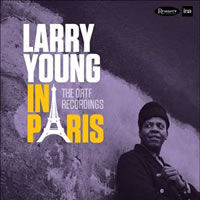 As archival issues go, this one is a real gem. Drawn from French radio recordings made during Young’s visit to the City of Lights in December 1964 and early 1965, the music is not only of genuine historical interest, it is also just superb music. The highlights are four tracks by the Nathan Davis quartet with Young, an on-fire Woody Shaw, and drummer Billy Brooks. This slice of Blue Note on the Seine is complemented by a studio session with Jazz aux Champs-Elysees All-Stars, and three short trio selections. It also boasts an exemplary informative booklet loaded with previously unseen photographs.
As archival issues go, this one is a real gem. Drawn from French radio recordings made during Young’s visit to the City of Lights in December 1964 and early 1965, the music is not only of genuine historical interest, it is also just superb music. The highlights are four tracks by the Nathan Davis quartet with Young, an on-fire Woody Shaw, and drummer Billy Brooks. This slice of Blue Note on the Seine is complemented by a studio session with Jazz aux Champs-Elysees All-Stars, and three short trio selections. It also boasts an exemplary informative booklet loaded with previously unseen photographs.
In the context of its time, Young’s organ playing really was revolutionary. Most organists were in the shadow of Jimmy Smith, whose punchy riffs, bop-inflected harmonies and snaking lines, funky blues feeling, and a penchant for crowd-pleasing overstatement had set the tone for the instrument for nearly a decade. Young embraced the modal approach of pianists like McCoy Tyner and his ensemble playing flowed around and through the band, creating a steady powerful push that propelled the music as surely as the percussive riffing common to most other organists. The new, more adventurous harmonic vocabulary and swirling, eddying rhythmic drive, as well as his attention to tone colors and textures made Young the first organist to pull away from Smith’s dominant influence. This set, recorded just a month after his Blue Note debut album, Into Something, and a year before his masterpiece, Unity, finds Young in top form during an early peak in his career.
The quartet led by expatriate tenor saxophonist Davis is worth the price of admission alone. Davis and Shaw had pitched in to bring Shaw’s Newark associates Young and Brooks to Paris, so they knew one another and clicked right away and Davis quickly caught on to Young’s innovative style. Davis, who’s never less than tasteful and craftsmanlike, erupts into ecstatic wails and moans on a jubilant version of Wayne Shorter’s “Black Nile,” and builds his solo on Shaw’s “Zoltan” with mounting tension and drama. Shaw, too, riding through “Zoltan” with sparkle and brilliance, brims with ideas and confidence. He steals the show on several tracks on this set. The give and take between Young and the horn players is extraordinary, with ideas passed among them and expanded on, and Young’s chords fleshing out solos or goading them forward. The quartet’s instrumentation and the presence of “Zoltan” make it seem like a dry run for Unity.
The bulk of the first CD is taken up with a jam session put together by radio host and pianist Jack Dieval. The quartet of Americans is joined by four French musicians, most notably the Lester Young influenced Jean-Claude Fohrenbach, and American ex-pat trumpeter Sonny Grey. Dieval is well intentioned, but an awkward pianist and drummer Franco Mansecchi is functional but unremarkable. But the rest of the band fires off some exciting solos. Grey, who is more closely tied to bebop, is a nice foil for Shaw, who is once again in ebullient form throughout. Young’s subtle ways as an accompanist – sometimes in the background, sometimes in the foreground – supports all the contrasting soloists. His harmonies and the watery flow of his bass lines and chording really seem to liberate and inspire Shaw on “La Valse Grise.” Young cradles the band in shimmering chords on “Talkin’ About JC,” and displays some blues touches amid the percussive chords and modal flights of his solo.
The best of these sessions can stand with some of the best of Young’s Blue Note dates. A most welcomed archival find.
–Ed Hazell